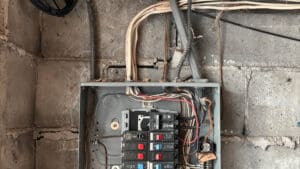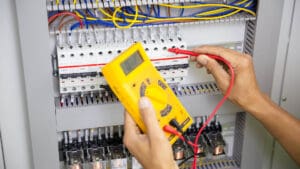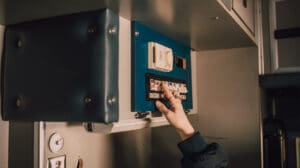Are you being woken up at 1 AM by your smoke alarm going off when there is obviously no smoke or fire? Or is your alarm constantly chirping at random but you don’t know why? Your smoke alarm going off without an obvious cause has multiple causes, such as poor placement, low batteries, dust or insects building up in the circuitry, or humidity causing water to develop.
Smoke alarms are designed to detect early warning signs of smoke and fire, but with many types of alarms, an alert may occur if there is a problem with the device, so that the issue can be addressed immediately and fire security can be maintained in your property. The following are common reasons why your smoke detector is going off when there is no fire.
How a Smoke Alarm Works:
A typical smoke alarm either uses ionisation or photoelectricity. Combination alarms that use both forms of technology also exist.
An ionised smoke alarm has a small bit of radioactive material between two electric plates, which causes the air to be ionised and allows a current to flow between the plates. When smoke enters the device, it disrupts the current between the plates, which causes the device to set off the fire alert.
A photoelectric smoke alarm contains a light source aimed away from an electric sensor. When smoke enters the device, it will cause the light source to hit the sensor, causing the alarm to go off.
Smoke Alarm ServicesDoes your smoke alarm need servicing? Contact us today for a free quote.
The Most Common Reasons Your Smoke Alarm is Going Off When There Is No Fire:
Low Batteries
One of the most common reasons for a false fire alert is that your smoke alarm is low on batteries. Low batteries are also a likely reason why your fire alarm is randomly going off in the middle of the night, and why it is consistently making a chirping or beeping noise at random. Low batteries are causing your device to go off because, unlike other types of sensors, a fire alarm uses power to keep the alert from going off, which is why any disruption to the system or spike/loss in power is causing a false alert.
To stop your device chirping or going off in the middle of the night because of low batteries, you should either book regular maintenance checks with a qualified professional or try to keep a record of when you last changed your alarm batteries so you can consistently replace them once every 12 months.
Humidity
High humidity levels can also cause false alarms due to water vapours developing inside the device. The vapours can’t be differentiated from smoke, and in both ionised and photoelectric devices the disruption to either the current or the sensor will cause the fire detector to sound off.
A smoke alarm going off due to humidity can be prevented by using fans, opening windows, and generally controlling the levels of indoor humidity to prevent a buildup of moisture in your device. If you live in an area of high humidity it is advised that you consider using devices that are specifically designed for environments with high levels of humidity. Residents should also be aware that high levels of steam from a shower or a bathroom may also cause a false fire alert.
Insects
Australian standards legally require that all smoke alarms have a protection measure against foreign bodies. However, tiny insects and pests may still be able to crawl into your smoke detection device. Insects cause a false alarm by affecting the inner workings of the device, either setting off the photoelectric chamber or disrupting an ionic device’s current.
To stop insects from crawling into your fire safety device, you can purchase smoke alarms that have greater protection measures against insects, or, you can try to reduce the general amount of insects in your home with proper pest control services.
Dust Buildup
A dust buildup will affect both ionised and photoelectric devices by disputing the air flow with a physical substance or by affecting the photoelectric light beam.
The best way to avoid dust build-up is to book regular preventative maintenance. With a professional residential or commercial electrician’s services, you can keep your devices well maintained and prevent any false alarms from going off due to a faulty device. A dust buildup can also be prevented by gently vacuuming your device and the area around it with a proper brush attachment, but a professional is more likely to be equipped and experienced enough to perform a thorough clean without damaging any vital components.
When Does My Smoke Alarm Need Replacing?
Some common signs that you need to call a professional to examine and either repair or replace your smoke alarm include:
- Beeping or chirping
- Flashing red light
- Squealing or screaming noises
- Age
The device’s sensor can wear out over time, so replacing old or outdated models is recommended to guarantee greater fire protection for your property. Each device should have a manufacturer’s date written on it. If your device is over 10 years old, it is recommended that you replace it with a newer model.
Express Tech Smoke Alarm Services
At Express Tech Services, we know all the required compliance and safety standards for any electronic device we stock like the back of our hand, including smoke alarms. Book a consultation with us if you are worried your fire protection equipment is no longer within safety regulations or if it is keeping you up in the dead of night.





